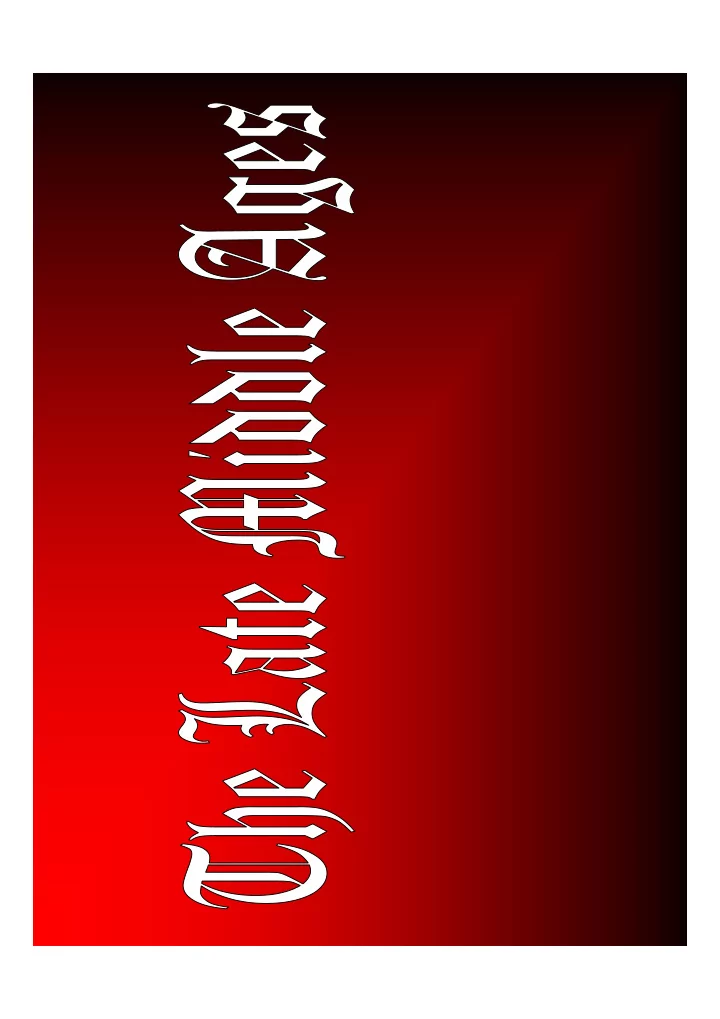

Clergy : were in charge of spiritual matters and they were supposed to save your soul Nobility : were the land-owners who played a significant role in government. They were there to protect their subjects. Third Estate : Included everybody that was left. This class included - Middle Class Peasants/Serfs Slaves
• Governmental system in which lords ruled over their serfs. • Serfs were basically slaves who had to pay tithes to their lords and were bound to the land. • Deteriorated because of loss of labor force due to Crusades and Black Death.
• Document that regulated the relationship between the king and his vassals. • Signed in 1215 in England by King John. • Important because it gave more rights and liberties to the people. • Later granted to all English people instead of just magistrates.
• Parliament in England started as the King’s Great Council. It was instituted in 1295 by Edward I. • House of Lords • House of Commons • Estates General in France was a failure. • Parlement of Paris was the law courts of France and was responsible for many French rebellions in later centuries.
• A great plague that devastated Europe in the 14 th century. • It killed 25 to 50% of the total population of Europe and continued to have reoccurrences until the beginning of the 18 th Century. • It caused many social and economic upheavals. • It also caused people to have a morbid preoccupation with death that is apparent in their artwork.
• 1337-1453. War between France and England. • Caused by a power struggle between King Edward III of England and King Philip VI of Spain. • Caused massive destruction to the countryside. • Ended in very little or no gain for either side. There was no formal treaty that ended it.
• Peasant Revolt in northern France. • Began in 1358 and was a result of the destruction caused by the Hundred Years War. • Led by Etienne Marcel. Nobles were murdered, houses were burnt, castles were destroyed. • Ended when the upper class finally came together and massacred the rebels.
• Peasant Revolt in England that was caused by rising expectations of the peasants. •The peasants marched on the city of London, demanding an end to serfdom. • The King promised to accept their terms if they would just go home, a request that they obliged. • After they left, the king broke his word, and rounded up the remaining rebels.
• Written in venacular form. • Basic Story • Symbolic Journey staring Good Friday, 1300 through hell, purgatory, and heaven. • Sums up all intellectual achievements of the age.
• Papal bull issued by Pope Boniface VII. • It stated that the church was above all other governments and reigned supreme in all matters both spiritual and political.
Pluralism – the Nepotism – practice of practices of officials officials appointing their holding more than relatives to offices that one office in the they were not qualified Church. or able to perform. Absenteeism – practice of officials not showing up to their appointed offices. Led to lack of efficient clergy work.
• Clement V moved the papacy to Avignon in 1305. • Many believed that the papacy was under the control of the French monarchy. • This period of time was known as the Babylonian Captivity of the Church. • It lasted 72 years until Pope Gregory XI returned to Rome in 1377.
• Pope Urban VI was elected because of riots in Rome. • A dissenting group of Cardinals ( the French ones) declared his rule null and void and elected Clement VII. • This division of the church lasted for 40 years. • Eventually in desperation all the cardinals got together and elected a 3 rd pope. • Finally, the Holy Roman Emperor Sigismond stepped in and convened the Council of Constantine.
• Religious movements that occurred in response to the Great Schism. • People no longer believed the church so they created their own system of beliefs. • Preoccupation with salvation led to a large increase in good works.
Recommend
More recommend